The Healing Room
Women a few steps ahead make you feel safe and seen
🌸 ikigai 生き甲斐 is a reason for being, your purpose in life - from the Japanese iki 生き meaning life and gai 甲斐 meaning worth 🌸
Before I even entered the room, a woman stopped me on that Oxford street. “Where are you going?” she asked, looking at my sparkly blazer. “I keep seeing women dressed wonderfully...”
“Samantha Harman’s Woman Who event,” I told her. “It’s going to be awesome.”
She looked like she wanted to be there too. Even that street corner moment felt charged, like we were all walking toward something magical.
I can’t quite explain what happened yesterday. I’m still processing. Something moved in me when I walked into that room in Oxford and realised I was safe. Actually safe. To cry, to be too much in my own weird not enough way, to stop performing acceptability for one afternoon.
I’ve been seeking signals of a sense of ikigai in journals, reading/writing and AI conversations. Yesterday I found it in something older and simpler, a room full of beautifully brilliant women who actively want to help each other thrive.
When women gather with intention, they create a room that regulates nervous systems, repairs shame and makes purpose feel possible.
The frequency of healing
Sparkly disco balls and pink lights at The Varsity Club. The noise was intense, and the heat… my sensory processing wavering but underneath a blip of overwhelm, I also felt something I don’t feel often, I felt held and therefore safe.
Not comfortable. Not calm. Held.
There’s a specific frequency that happens when women gather with intention. Not performing or competing. Just... being. Creating space where you can stop calculating how much of yourself is acceptable and just exist.
These spaces are rare. (Well in real life anyway, I’m a member of some fabulously nurturing online circles.)
Most professional spaces require performance, especially for the way women have been conditioned to be. We measure ourselves out in portions. Tracking whose feelings might be hurt by our presence. Making ourselves smaller so others feel bigger. You learn the exact ratio of competence to likability that keeps you employed or accepted and not a threat.
Most social spaces require curation. You filter your stories. You present the acceptable highlights. You laugh at the right moments. You never cry where people can see.
But yesterday’s room operated on different rules. Sophie Jane Lee stood up to deliver her brand new keynote for the first time “Don’t You Dare Apologise.”
She’s “the woman who tells the truth on LinkedIn” and “keeps getting kicked off.” She talked about feeling damaged “I felt at an earlier point in my life that there was something fundamentally wrong with me” … and the room breathed.
I’ve been asking that exact question my whole life.
Is there something fundamentally wrong with me?
Growing up on a council estate and then foster care, you fear that the answer might be yes. That’s why you’re there, isn’t it? Because something about you or your circumstances are fundamentally broken. You learn to calculate, how much of yourself is safe to show? Too much emotion means you’re difficult. Too many needs means you’re high-maintenance.
Sophie shared “We’re taught to be palatable because that’s how we survive. Don’t hate yourself for that survival mechanism.”
Later she’d post “Shame breeds in silent spaces. This is one of the many reasons I am so passionate about sharing all the messy human truth of things.”
I’ve been performing palatability for forty-nine years. Measuring myself out in acceptable portions. Watching for danger. Bracing for rejection.
Yesterday’s room said you can stop now. Just for today. You can be all of yourself and we won’t flinch.
That’s healing. Not in a vague, spiritual way. In a nervous system way. In a “my shoulders dropped two inches and my jaw unclenched” way.
What a few steps ahead looks like
Samantha opened the event talking about her council estate childhood, as a “this is where I’m from and it made me” statement of fact. She invited us to see the room and event as a portal to our next level *LOVE*
Rowena later spoke about going to Oxford University and feeling like she’d stolen her place there. She used the word underclass. Not belonging in rooms like these.
I adored watching these brilliant and vibrant women, successful, visible, taking up space on purpose.
This is what “a few steps ahead” actually means. Not unreachably famous, but talented and awesome and achievable. Women who’ve walked the path you’re on and survived. Who show you the council estate to holding the floor in exclusive rooms journey is possible. Who prove that being from nowhere doesn’t disqualify you from going somewhere.
I needed to see this embodied. Not read about it. See it. Watch women who come from places I come from, stand on stages and thrive.
Growing up on a council estate or in care teaches you that ambition is for other people. Wanting things… visibility, success, mattering, is proof of your fundamental selfishness. You should be grateful for whatever scraps you get.
These women had looked at that programming and said no. They’d decided being too much was better than being nothing.
That transmission only happens through presence. Your mind can know it intellectually. Your nervous system needs proof.
Why this matters more now
The panel in the afternoon talked about digital content fatigue. How people are exhausted by polished snippets and not knowing what’s real and what’s not. How they’re hungry for long-form, deep, soul-filled and filling content. For real humanness, even messiness.
“Getting visible is about getting over yourself,” they said. “People want to walk beside you, not just peek through windows at perfect rooms. If no one sees you, you’re robbing the world of that experience.”
And I thought, yeah this is it… it matters so much not just for your own sanity, but for all the people around you that you want to help too!
I’ve been writing about the ikigai risk of AI for a while now, how automation threatens to disconnect us from purpose and presence. How we’re teaching AI that numbness is normal by feeding it our most filtered, curated selves. How the antidote to algorithmic life is messy, unedited humanity.
But I’ve been largely trying to solve it intellectually. Through essays and frameworks and AI prompts that help me process my thoughts.
Yesterday showed me an important antidote… Rooms. Bodies. Presence. Women who reject polish or blending in. Co-regulation that happens through being near each other, not through screens.
Sophie talked about not self-regulating into smallness, but being around people who help you regulate back to where your full size should be. Your nervous system needs other nervous systems to recognise what safe actually feels like.
AI can’t do this. It can help me clarify. It can generate ideas and hold space for my processing. And I’m grateful for all of that… I use AI daily and teach others how to use it well.
But AI can’t hold me whilst I cry. It can’t show me through its own body that being visible won’t destroy me. It can’t give me proof that women from council estates can wear sparkly blazers to Oxford and be fine.
Later, on LinkedIn, I wrote to Sophie “I do still struggle on and off a lot with that question of whether there’s something fundamentally wrong with me” She replied “There is nothing fundamentally wrong with you, that I can promise you. You maybe just needed to find your people *waves*“
Find your people.
Not “fix yourself.” Not “work on your confidence.” Not “process this more thoroughly.”
Find your people. Be near them. Let your nervous system learn.
What fifty knows
I turned fifty this week.
For nearly two years I’ve been writing essays, tracking patterns, building frameworks, processing with AI. Asking, what gives life meaning? What’s my purpose?
And underneath all of it, a real question I’ve not consciously tackled… Is there something fundamentally wrong with me?
You won’t easily find ikigai if a part of you believes you’re a mistake. You can’t live your reason for being when you’re performing an acceptable version instead of the real thing. Purpose can’t flourish in the gap between who you are and who you think you should be.
Yesterday, I walked into a room that answered my unasked question with a resounding, NO! There’s nothing wrong with you. Being palatable was smart, it kept you safe when safe was hard to come by, but you shouldn’t need that mechanism anymore.
You’ve journaled and processed and built frameworks. Now you need different medicine. You need rooms that hold all of you. You need women several steps ahead showing you it’s possible. You need your nervous system to learn what your mind already suspects.
The healing doesn’t happen through more thinking. It happens through being held.
What you might need
If you’ve been seeking purpose like me through solo work… journals, AI conversations, frameworks, keep doing that. It matters. You need internal clarity.
… but also find *your* healing room. Find the people several steps ahead. To watch not worship and let your nervous system learn that being visible won’t destroy you.
These rooms are rare but they exist;
Events where vulnerability is modelled, not performed
Gatherings of people who’ve walked similar paths
Moments where you can stop bracing and just breathe
You might not find them easily. You might need to create them. A gathering where the rule is to show up as all of you.
Some wisdom only transmits through presence. Through being held by people who look at you and their whole being says “you’re not too much, you’re exactly right.”
AI can help you think. Journals can help you process. But healing? That requires rooms. Bodies. Women who’ve already kept walking through the fear.
Find or create your room. Let yourself be held.
The world needs your soul, your mess, your particular too-much-notenoughness. People are tired of digital perfection. They’re hungry for the real thing.
Your ikigai can’t flourish when you’re performing. Your reason for being lives in the unedited version you can be when you are allowed to heal.
Sarah, seeking ikigai xxx
PS - Journal prompts if you want to process this further:
Where have I been seeking answers that might require presence to fully land?
Who are the people several steps ahead showing me what’s possible? What specifically do they embody that I need to see?
Is there a question I haven’t dared to ask?
When have I felt emotionally safe in the presence of others? What made that space different?
What survival mechanism am I ready to thank and then consciously choose to use less?
PPS - Take your journal and feed it in to AI and/or use it to help you dig deeper;
“I’m realising that some wisdom can only be transmitted through presence and embodied proof, not just intellectual understanding. Help me explore: What am I trying to understand that I might need to experience in person? What would ‘seeing proof’ look like for me? What spaces or people could offer me the co-regulation I need?”
“I’ve spent years seeking answers through solo work, but I’m learning I might need to receive something from others who’ve walked this path. Ask me questions that help me identify: Who are my ‘several steps ahead’ people? What do they know that I’m trying to learn? What’s stopping me from being near them or learning from them?”
PPPS - A Feminist lullaby - Today it had to be Alanis Morissette with Brandi Carlile, That I Would Be Good… unapologetically tender, fiercely kind. For anyone else learning to take up space and to heal.



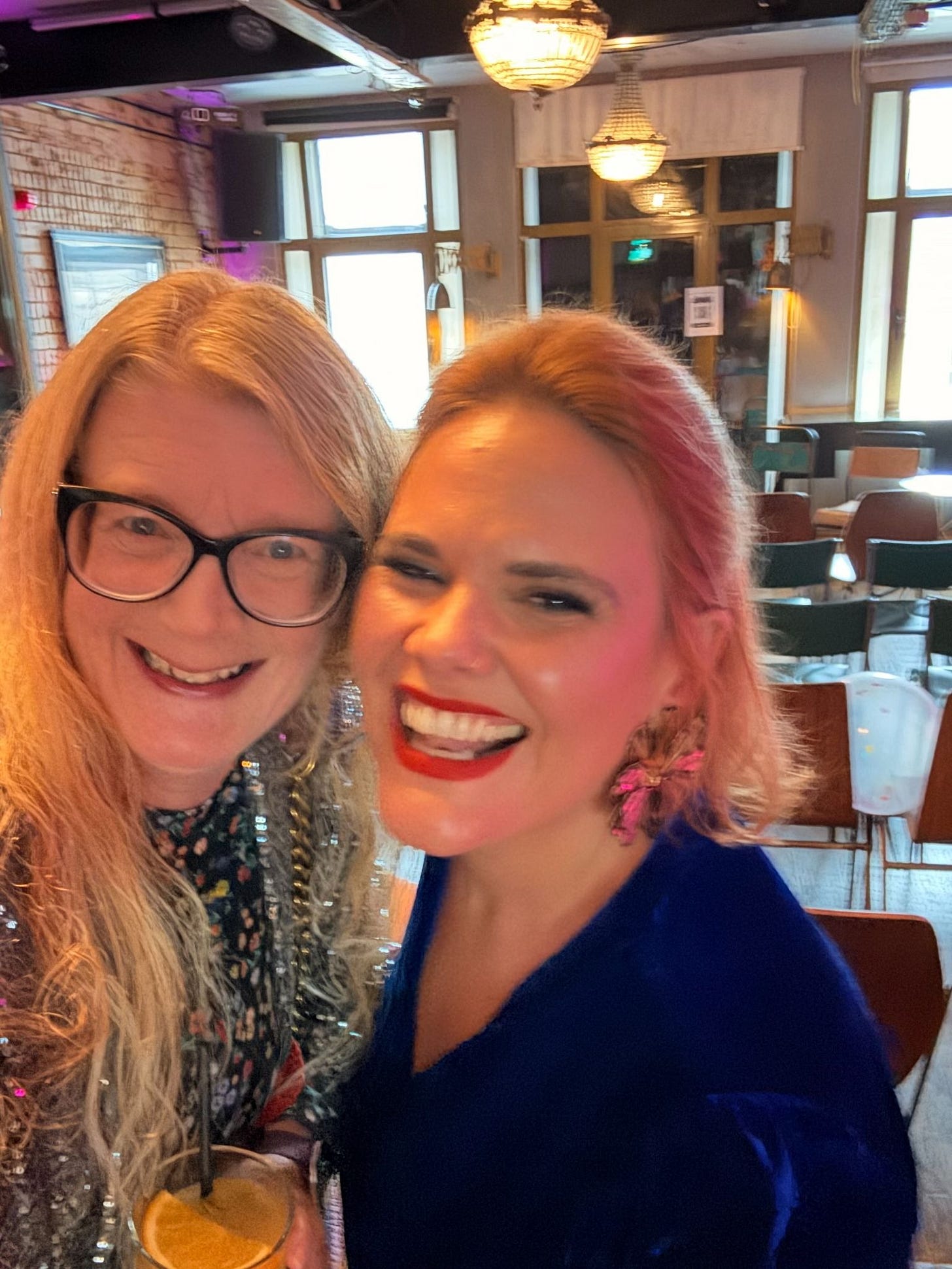
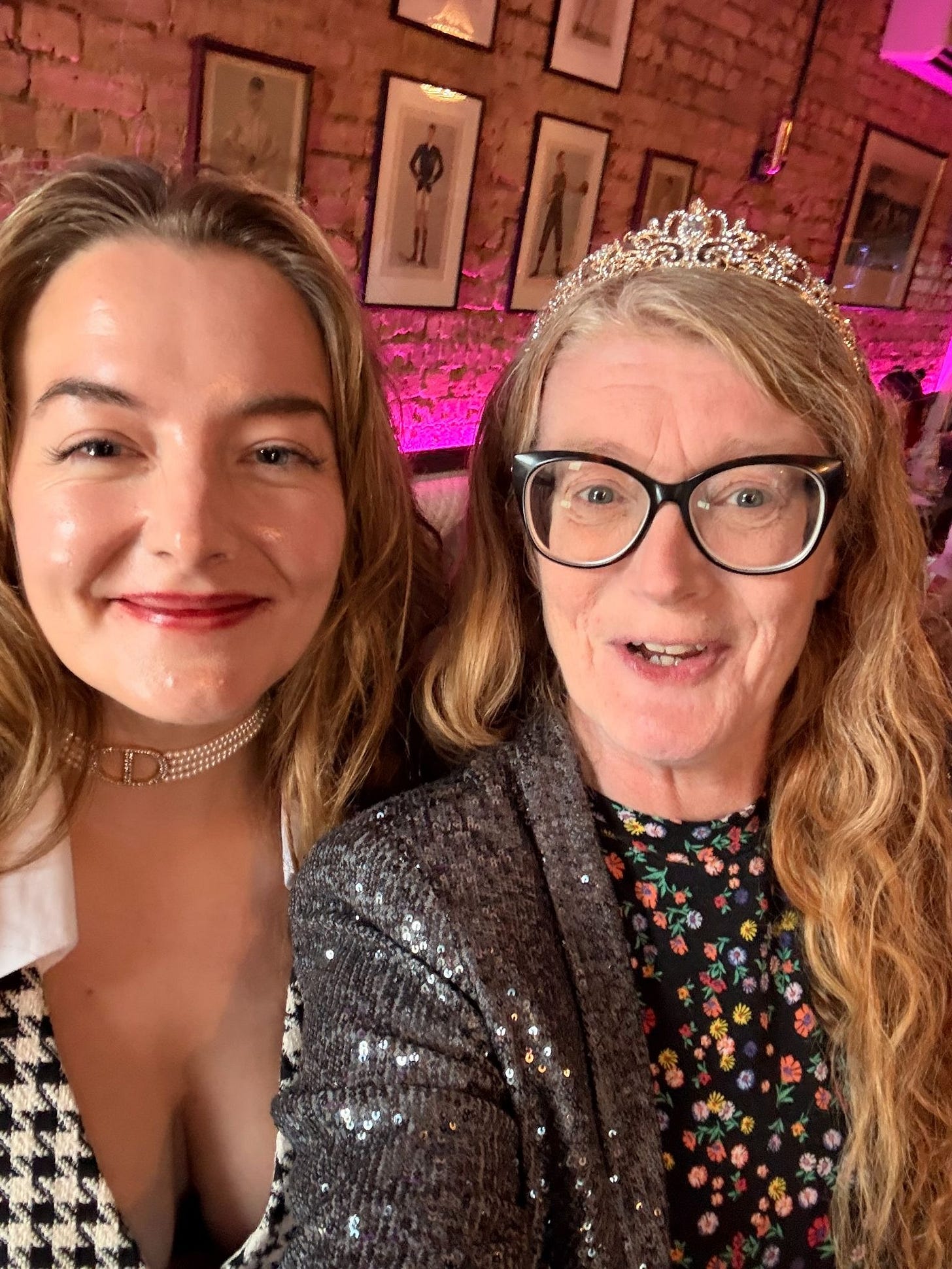
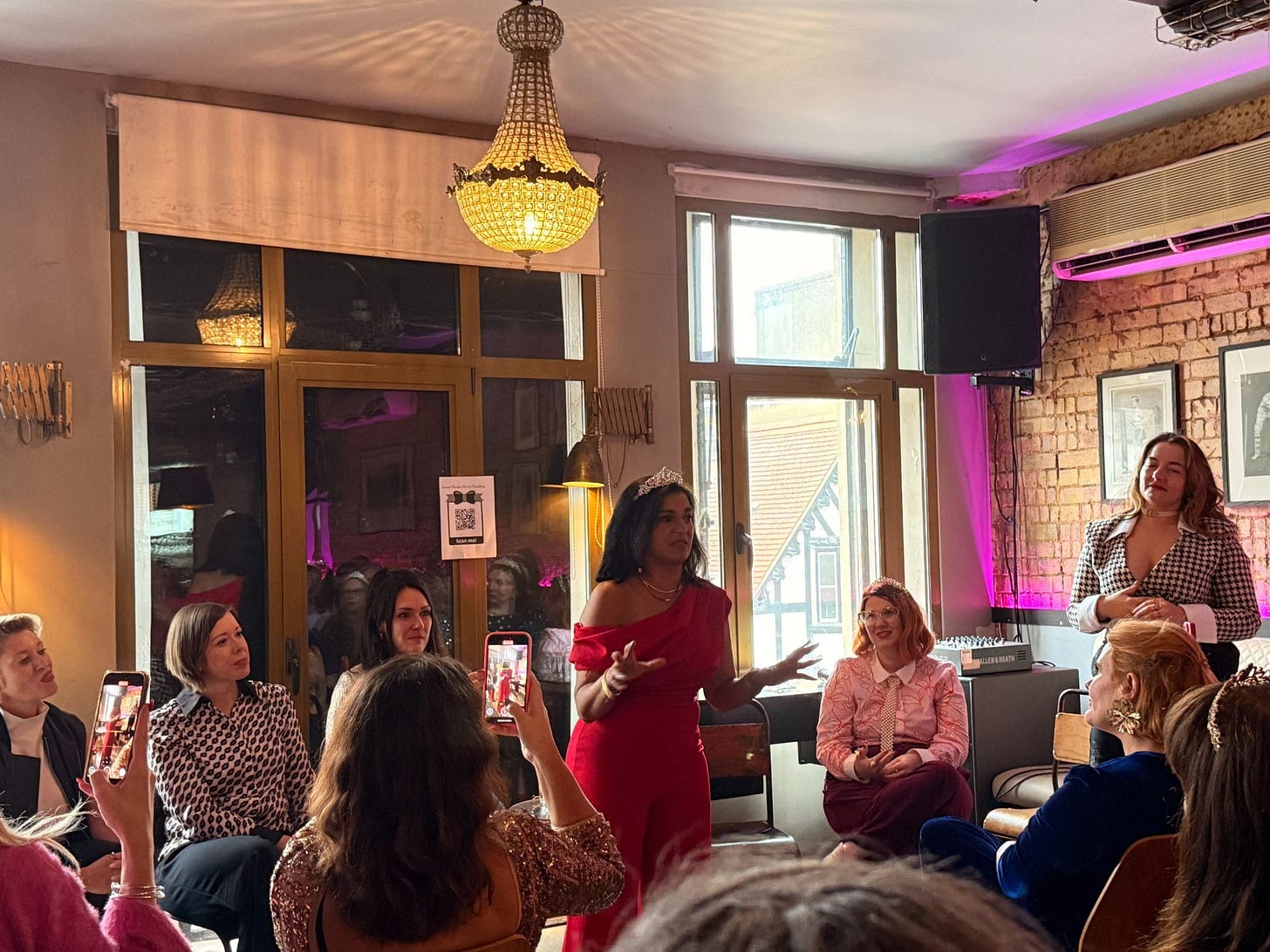
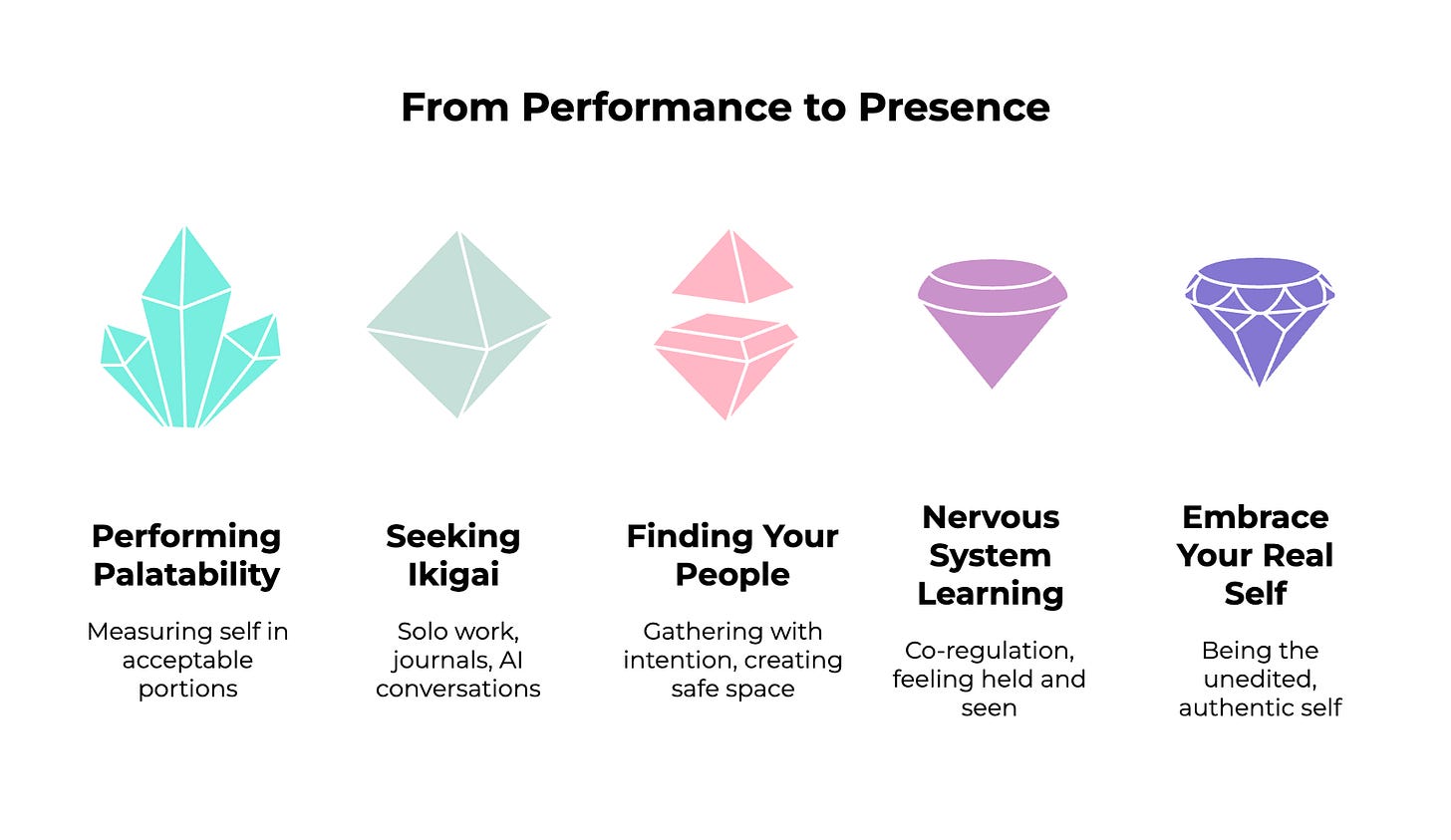
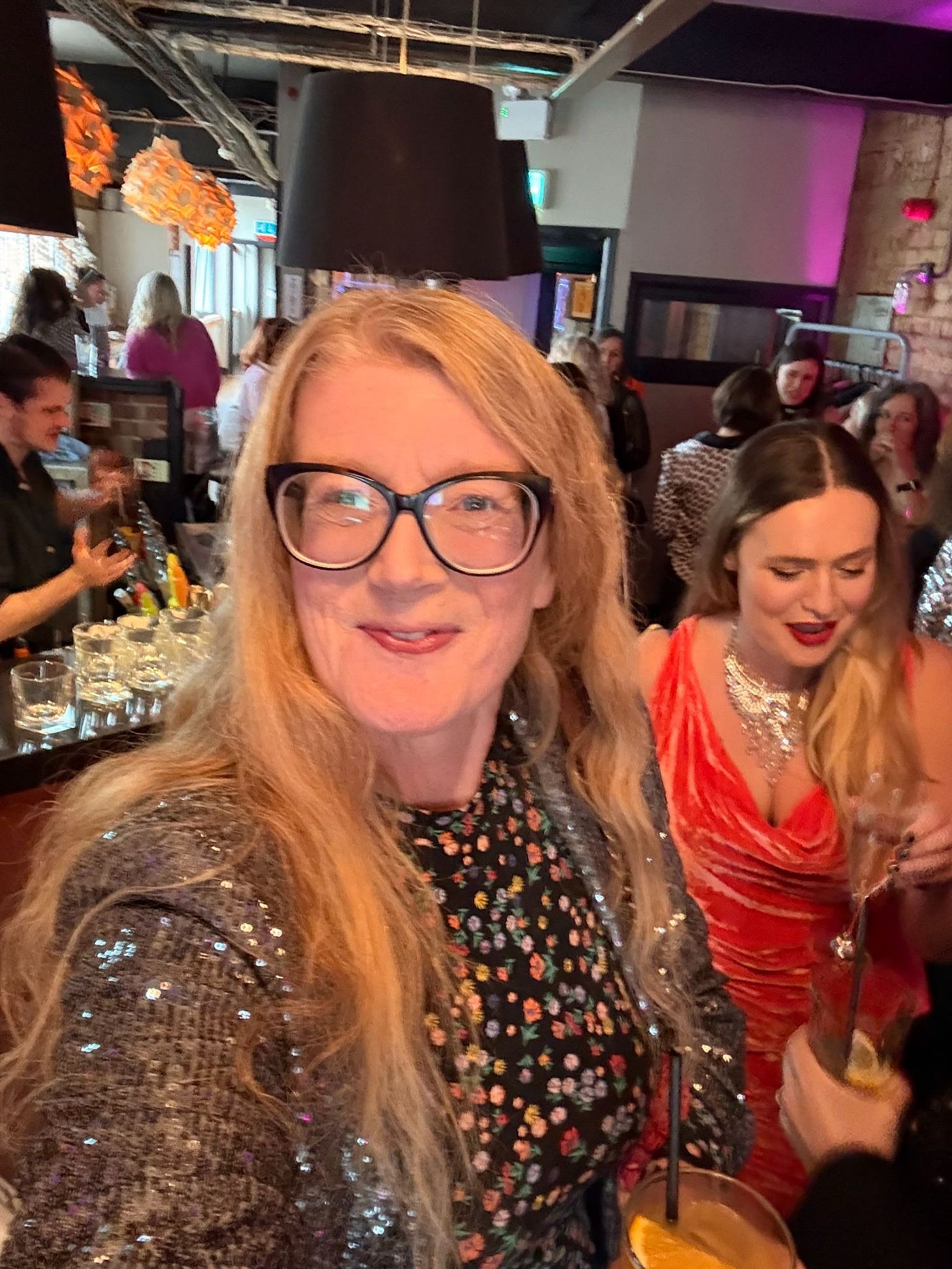
Happy wonderful 50th! Sounds like you've had a wonderful time and I wish I could join your women's group!! ❤️